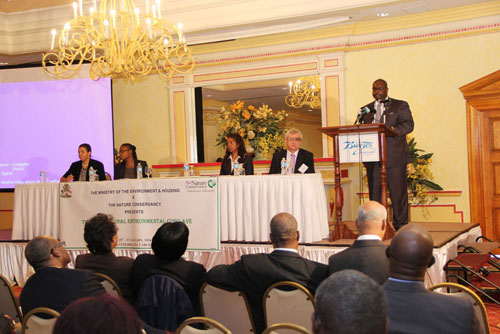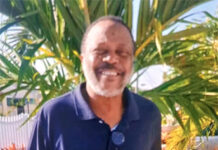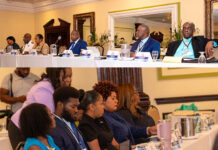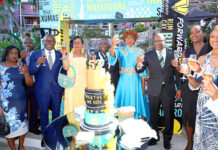
Nassau, The Bahamas — Developing a sustainable plan for the environment that exceeds the five year election cycle, the Ministry of the Environment met with stakeholders to gather consensus for a meeting of the minds.
“I have said before that the environment of our nation is its greatest blessing, so much so that we have created a world class tourism industry based on our sun, sand, and seas. In addition to these, we are also blessed with great landscapes, beautiful marine life, blue holes, coral reefs, indigenous trees and flowering plants and much more,” said Kenred Dorsett, Minister of the Environment and Housing.
“Since assuming the office I hold as Minister responsible for the environment, I have gained a greater appreciation for the beauty of the Bahamian environment and those who work to protect it. Our environment sustains our lives and livelihoods. Although we are still a developing nation, the beauty and diversity which the Bahamian environment holds should be protected zealously for and by the Bahamian people.”
Minister Dorsett gave the opening address at the two-day (Jan. 29-31) Nature Conservancy’s first National Environmental Conclave, in the Ballroom at SuperClubs Breezes.
“This past year in particular, my ministry, and by extension the government, has made incredible strides in many areas of our work to protect the environment. We have introduced and implemented plans, tabled legislation and advanced policy positions which I think are taking the country in the right direction. I will highlight some of our accomplishments and future goals for you,” said Minister Dorsett.
“In August of last year, the government revealed its energy sector reform strategy with a statement released by Prime Minister Christie. In his statement, the Prime Minister outlined the government’s key objectives for reforming how we generate, transmit and distribute energy in The Bahamas.”
Minister Dorsett listed the objectives as:
To provide energy supplies to consumers that will meet long term growth demands for energy;
To increase international competitiveness in production in order to promote economic development and job creation;
To utilise economically viable renewable energy sources to promote environmental sustainability;
To provide long term energy security to producers and consumers;
To increase Bahamians awareness of energy, its use and conservation methods in their daily lives;
To increase energy efficiency;
To provide modern and expanded energy infrastructure;
To create a regulatory framework that promotes transparency, investment, competition, efficiency, and public-private partnerships;
To foster sufficient flexibility that adopts and adapts to new energy technologies;
To establish an institutional framework with high levels of technical capacity to support and facilitate the implementation of policy by all stakeholders; and
To provide investment and business opportunities with spin off benefits to other sectors.
“The first step in the reform process in the words of the Prime Minister was to issue a ‘Request For Proposals’ (RFP) to seek a partner or partners to assist us in turning around our energy sector. Our objective is to realign BEC, and to create efficiencies which will allow for significant reductions in the cost of energy, increased energy security, environmental responsibility, reliability, and increased competitiveness as a country,” said Minister Dorsett.
“The RFP was issued and we are at the stage in the process where five bidders were invited to clarify and expand upon key elements of their bids and prepare final submissions by the end of January 2013. Once the final submissions are received and evaluated our advisors will make final recommendations to the government and its expected negotiations will commence in late February to early March 2014 with selected parties.”
Minister Dorsett said that as a part of this process the government will also explore the possibility of using cleaner fuels for new power generating facilities and explore the incorporation of independent power producers utilising solar energy in the Family Islands. He said it will enable Bahamians to honour the commitment outlined in the Charter for Governance to reduce the country’s reliance on fossil fuels. In addition, the issue of remediation efforts at Clifton Pier will also be addressed as a part of the reforms, attempting to resolve an environmental calamity that has existed for several decades.
“With regard to renewable energy as part of the government’s energy reform initiative, we are committed to our goal of 30 percent renewable energy by 2030. We also remain committed to our goal to advance a residential energy self generation programme this year in 2014, allowing approximately 25 MW to be tied into grid through a net billing or metering programme,” said Minister Dorsett.
“As an extension of this goal, the government in its 2013-2014 budget removed the tariffs on inverters for solar panels, solar panels, and LED appliances to ensure that more Bahamians can access these energy saving devices which can also save Bahamians money on their electricity bills.”
Minister Dorsett said the government has seen the benefits that solar powered devices can bring to the Bahamian people. He said with the assistance of the Inter-American Development Bank (IDB) and the Global Environment Facility (GEF), the government was able to advance two pilot projects devised to collect data on renewable energy technologies.
“The first project provided for the installation of solar water heaters and the second project for the installation of photovoltaic systems in Bahamian homes. The data received thus far confirms that these devices are benefiting those homeowners who have them on lowering their electricity consumption thus saving them money,” said Minister Dorsett.
“My ministry would like to expand on the success we have seen with the installation of these green devices by developing the nation’s first green subdivision. This proposed community would feature solar power and/or energy efficient LED residential and street lights, solar water heaters, PV solar grid tie systems and energy efficient construction methods. I envision that this development would become the model for all future public and private sector housing projects.”
Minister Dorsett said he tabled several pieces of legislation that will greatly impact the work of environmentalists, particularly the Bahamas Protected Areas Fund Bill.
“As I explained in my communication to Parliament, during the seventh conference of the parties (COP-7) of the convention for biological diversity (CBD), held in 2004, it was agreed to promote the establishment and management of national systems for protected areas. This agreement includes a series of specific activities that the Government of The Bahamas among others committed to implementing within clearly defined time frames,” said Minister Dorsett.
“The overall objective of The Bahamas Protected Areas Fund is to provide a legal framework to ensure sustainable financing into perpetuity for the management of protected areas in The Bahamas. This is inclusive of management activities, scientific and policy research and education supporting the conservation of biodiversity and the overall implementation of the convention on biological diversity and the Caribbean Challenge.”
Minister Dorsett said that this is an important initiative that having protected or managed areas will enable environmentalists to sustain and expand the fisheries resources throughout the archipelago properly. He said local fishing communities could be incorporated throughout The Bahamas to create additional blue entrepreneurial opportunities and blue jobs. He said regional environmental ministers throughout the Caribbean, Latin America, and extended to the Pacific region are committed to be successful in managing blue resources and learning from the mistakes of the past.
“Amendments were also made to the Forestry Act. We all know the importance of forests to our environment , they clean our air, filter our water, and buffer the impacts of climate change. The Bahamas possess considerable forest resources of pine, coppice hardwoods and mangroves. Approximately, 80 percent of forest resources are on State Lands (Crown Land),” said Minister Dorsett.
“The Amendments were sought to best lands in the Minister in order that he may be able to declare the National Forest Estate, for classification as forest reserves, protected forests and conservation forests. This will now enable us to advance our efforts in re-establishing timber production, utilising, our forests for gaming reserves and developing a hunting industry in The Bahamas, thus creating green entrepreneurial opportunities and green jobs.”
Minister Dorsett said that in the near future he also plans to bring before Parliament, the Public Parks and Public Beaches Bill, which will establish the Public Parks and Public Beaches Authority.
“A body, which will be charged with identification, regulation, maintenance, development and conservation of public parks and public beaches. This is in line with the government’s commitment to provide green spaces for Bahamians. This is another initiative, which will create green entrepreneurial opportunities and green jobs,” said Minister Dorsett.
He also said that last year December the Department of Environmental Health (DEHS) produced its first published garbage collection schedule, edited by constituency, polling division, day of the week, and time of day, that Bahamians can expect to have trash collected from their residences. He said in tandem with this measure, the DEHS also contracted multiple private companies to aid in the collection of residential garbage while the Government of The Bahamas decides the way forward with all the relevant information in hand, such as the cost to repair or replace the fleet of government owned trucks, etc.
“We also introduced a short term programme for the collection of bulk waste, which consists of such items, as household furniture and appliances. This exercise yielded the collection of over one million pounds of garbage off the streets of New Providence in 45 days and there is still more to be removed. The government has also signed a contract for the construction of a material recycling facility at the New Providence landfill and the remediation of the same,” said Minister Dorsett.
“These exercises and initiatives inclusive of the introduction of a schedule for trash collection are the first steps to bringing The Bahamas into the twenty-first century as regards to trash collection, recycling and waste management. In the next budget year, the derelict vehicle site on Marshall Road will be moved to a site adjacent to the New Providence landfill as we begin to address the deplorable state of our landfills and dump sites in the Family Islands.”
Minister Dorsett said DEHS also released a shanty town report, which outlined some of the extreme environmental infractions and concerns found within these unauthorised communities.
“I moved immediately to establish a shanty town unit within DEHS to systematically combat this age old issue. To their credit, they have been able to demolish several of these communities already in a humane and peaceful manner. There is more work to do and we are resolved to do it. These initiatives continue daily as it is my intention to eradicate these shanty towns that our people can live in better conditions and those environmental concerns, such as the presence of faecal matter in water and the presence of derelict vehicles would come to an end,” said Minister Dorsett.









